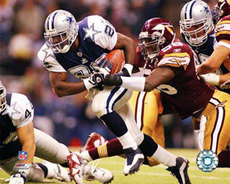 "It's just a fantasy. It's not the real thing. But sometimes a fantasy is all you need." That is what Billy Joel tells us. It is rewarding to be a fantasy geek because it is a good dry run for excelling in gambling but I know some people do not play fantasy sports because he does not want to have that rooting brain-teaser of betting on one side. I found that fantasy football had me analyzing from an extraordinarily different and favorable viewpoint than before I met gambling’s cousin. I had situations like having Emmitt Smith in his prime when he was the inimitable running back in the league. I can for example remember one week when two offensive linemen were out and the Pokes were on the road. Plus I had Chris Warren when he was in Seattle and he was playing a team without their two best run stoppers. Should I consider benching the world’s best running back because his match-up in not favorable? For the record, I stuck with Emmitt, but scrutiny like that actually refined me into dissecting games like few handicappers had ever before. Fantasy sports managing helped me breakdown big match-up mismatches. It especially facilitated my acumen when it came to betting over/unders. Quite often imprudent handicappers deduce that an injury to a key offensive player may mean fewer points or a key defensive player more points. But in my fantasy breakdowns it became quite apparent that if a run blocker on the offensive line was hurt, it might mean the team has to pass more. Kindred to that if a team’s leading rusher were out and his backup were an ample drop-off. Often teams to compensate will have to fiddle with their gameplan and in such examples open up their offense. A depreciated offense does not mean lower scoring. So many sports speculators and general football fans fall prey to the myth that the better an offense is, the more points they will number. A better offense is not necessarily a high scoring offense and to a lesser extent a superior defense is not inexorably going to give up more points. A great defense, whose strength is stopping the run, may force the opponent to take more risks. A bad defense that has a decent secondary may be run against more often. Ergo the posted totals would be over-adjusted. Hence the top fantasy sports advice sites can be priceless tools for sports cognation. In fact, now every major sports site, from ESPN to Yahoo has fantasy information of some kind. For the most part, if it is of value to the fantasy player, a handicapper should take note. But there are compelling contrasts too. The word’s best fantasy player could be a dreadful handicapper and visa versa if one probes them as one and the same. We handicappers must explore games one at a time, while the fantasy players must query long-term performances. Really this seems to happen more in baseball with hotshot pitchers up from the minor leagues, but can also apply in football. Joey Harrington may be great for your keeper league, but there will be peaks and valleys along the way. Actually a head-to-head league in which a participant changes his line-up is more conducive to handicapping than the rotisserie style leagues, but both are sources of knowledge. Using fantasy sports and the foremost sites dedicated to such can make a winning football season more than just a fantasy. That’s the real thing.
This is your new blog post. Click here and start typing, or drag in elements from the top bar.
The beginning of the professional football season is upon us, but for millions of hardcore football fans, it is the fantasy football season that may hold greater significance. Fantasy football brings out the virtual general manager in any football fan as rosters are analyzed closely, friends or co-workers are sudden rivals and every game on TV has importance.
For those who don't know, Fantasy Football is a game in which participants (called owners) are arranged into a league. The person who creates the league is called the commissioner, and that person invites other owners into his/her league. Each team drafts or acquires via auction a team of real-life football players and then scores points based on those players' statistical on-the-field performances each week. Fantasy football, a niche pastime just 10 years ago, has blossomed to the point that nearly every office has at least one league, probably more. Participants go to great lengths to prepare strategies for their annual drafts, oftentimes perusing magazines, Web sites and other sources -- all in an effort to get the edge over their opponents. The fantasy football frenzy has littered the country with odd nicknames, strange league traditions and ongoing scrutiny of players and matchups. How far have fantasy sports permeated the sports entertainment business? More than a dozen magazines are currently on newsstands, each promising to help fantasy players find the best players for their team. CBS, Fox, and ESPN each devote significant air time toward promoting their online fantasy products and run regular statistical updates during games to cater to the fantasy football-playing viewers. A recent Sports Illustrated article notes that 28 percent of CBS-partnered Sportsline’s revenue comes from fantasy sports. Most local sports-talk-radio stations have had to adapt to accommodate the booming listener interest in fantasy sports. Nine years ago, Twin Cities sports talker KFAN was struggling with fantasy football callers dominating its programming throughout the day. The station stopped the intrusion by giving fantasy programming its own weekly show. The show remains on the air today and provides the station with its strongest weekend ratings. Fantasy sports has grown enough that corporate America is beginning to market directly to participants. This year, for the first time, a major retailer is getting behind fantasy sports. Backed by 70 weekly prizes worth more than $20,000, Best Buy has rolled out a free-to-play online fantasy football game. The game challenges users to create a roster of fantasy players while staying under a salary cap. Prizes include plasma televisions and home theater sound systems. Being a fantasy player and sports fan is not just about passion and the thrill of the game. It’s also about being social – with friends, family, and of course any rival-team supporters. It is the bragging rights you get within your officemates or your friends and the cheering sound of your draft fans or other people that makes it even better. So are you ready for Fantasy football? Let’s play fantasy football now.
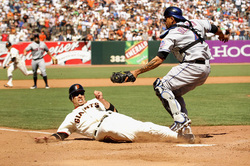 Just about everyone in the country has heard about fantasy sports by now - in one of the following ways. 1) Actively into it, 2) have considered playing it, 3) have no interest in it, or 4) think it's just plain dumb. I happen to be a number 1, converted from a number 4. I used to think that the whole concept of fantasy sports was about the craziest thing anyone could do. A total waste of time. However, I will admit I knew nothing about the inner workings of it. I'd hear people talking about it and think they needed to get a life. That all changed last summer, while I was building a deck for a friend. As I was taking one of my frequent breaks for some liquid refreshment, he asked me if I was interested in joining a fantasy hockey league. I decided to take the plunge. First of all, I learned rather quickly that it's not limited to the younger generation. People of all ages and occupations participate. I became a fantasy junkie once I figured out what was going on, I started getting intrigued. I watched the results seven days a week. Moved players around, putting in the hot scorers and seating the slumping ones on the bench. Kicking myself when I made a wrong move, congratulating myself when it worked. I became obsessed with where my team stood. Crazy? Perhaps. But I enjoyed it, and that's what counts. Anyway, in a nutshell, here's fantasy sports all works. Fantasy sports are basically individual teams made up of real players from various sports. Each participant in the league manages his/her team. In hockey, for example, every NHL player is available for use. The same with the other sports. It makes no difference which actual teams the players are with in real life. Statistics, scores, standings, and everything else is based on each player's performance in the real-life games. Fantasy sports managers obviously strive to get the strongest-performing players on their lineups. Just like the pros, fantasy teams draft players. A league commissioner is named and he/she sets up the time for the on-line draft. In our league, draft selection was randomly determined. When all participants are on-line at the pre-established time, things get under way. The first player makes his/her choice from a list. Then the second, third, and so forth. I happened to get last pick in a 10-team league. But it evens out. When it got to me, I chose a player, and immediately got to select another. On the second round, it went in reverse. Everyone got an equal chance. How do we know who to select? Detailed information is provided by the host website. Statistics on each player's past performance over several years, player ratings, expert advice, you name it, is all included to help people make wise choices. The entire process went very smoothly. The teams were established, and it was game time. My league was head-to-head competition. That is, one team's stats are pitted against another's for an entire week. Final results (categories won, lost, or tied) after the week are posted, and the standings are adjusted accordingly. The following week brings a new opponent. If a player in real life gets hurt and goes on the IR (injured reserve) list, another player is permitted to take his place on the fantasy roster. Once the player returns from IR, that player can be re-activated, but the substitute or another player must be dropped. Rosters cannot exceed a certain number. Scores and performances are updated daily. Many fantasy players check the progress of their teams each day throughout the season, although it's not necessary. League standings are posted every week. Some participants are extremely serious. Some don't care all that much and just go with the flow. Our league commissioner happens to be one of those who is out to win, and in a big way. He's into it 100%. Very competitive. So what's the reward? Not much for other people who don’t place money in it, other than bragging rights. However, it's safe to say that many leagues play for something more than fun. People place wagers on just about anything, and it would be foolish to think that fantasy sports are an exception. Some of those leagues are undoubtedly cut-throat, especially when large sums of cash are involved.
This is your new blog post. Click here and start typing, or drag in elements from the top bar.
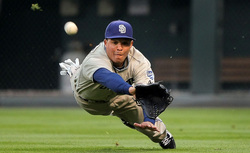 One of the best things about the beginning of a specific sport season is the ability to play fantasy sports with your family, friends, or even strangers. Growing up, I used to draft so many teams that I never kept up with any of them. This year, I realized that is unfair to others so I did not make that mistake. I joined four leagues and had the ability to keep up with them, certifying my full first season in fantasy baseball.It has been a fun experience. While the seasons are not quite done yet, I have ranked respectably in all of them and will make playoffs in all of the head to head leagues I am in. Something I got from this experience, however, is noticing that most fantasy baseball players focus on building their lineups through power. Nothing wrong with this strategy other than the competition for the power hitters may be saturated in your league. Power hitters produce the home runs, runs batted in, and likely strong numbers in the runs department. What I did not see was players attempting to build a lineup through speed. I am sure it has been done and would love to know the results from players who have done this, but the idea is to build a lineup through leadoff hitters instead of pure sluggers. This strategy would replace the effectiveness of the home runs and runs batted in categories with stolen bases and runs. The strong numbers from runs would be replaced with a strong batting average from the leadoff hitters. The key here would be to have at least a little power in your lineup, primarily from the first baseman and catcher positions because of the inability to find a leadoff man at these positions. Ideally, one would attempt to draft an Albert Pujols, Prince Fielder, or a Miguel Cabrera type first baseman with his or her first pick. This person would draft a catcher with a high batting average or someone similar to Yadier Molina who will at least maintain the batting average stats. They could also draft a catcher based on his position in the lineup. Bengie Molina would be a perfect example of this as he was batting toward the cleanup position at the beginning of the year. The major advantage to this is that most opponents would not be using this strategy, so there would not be the saturation that there is for drafting hitters with pure power numbers. It is important to not just draft players based on stolen bases, however. Some of them bat toward the bottom of the lineup (ie. Jason Bartlett), and those run production numbers that you are relying on will not be sufficient with someone batting in that part of the line up. This article is ust an idea for those that enjoy fantasy baseball, and I would enjoy hearing from anyone who has used this approach or anything similar to it and how that person fared. Good luck in your fantasy sports game and I hope you will enjoy it as much as I do.
This is your new blog post. Click here and start typing, or drag in elements from the top bar.
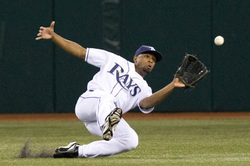 Fantasy baseball is great. There are so many methods one can attempt to overthrow his or her opponents during the season but only one person can hold the golden trophy at the end. Below are some strategies you may consider using in your rotisserie or head-to-head 5x5 league. Be aware that these are not fool proof: Balanced. One of the major strategies for fantasy playing. This opponent is not trying to be great at anything, but just focusing on building a team that can be competitive in every category, eventually becoming dominant in a category by the end of the draft or season. You have a legitimate chance to win a category every week, but you also have a chance to lose. Power Theory. Another major strategy in the fantasy world. This player focuses on his homerun and runs batted in potential, essentially punting stolen bases. If a player does not put enough emphasis on batting average during this process, he could be punting batting average without even knowing it. The idea is that power hitters put up the most offensive stats, and that they should be valued much higher over leadoff caliber hitters. Leadoff Theory. This strategy revolves around drafting players who are solidified leadoff hitters and produce at the top of the lineups. Leadoff hitters are specialists in runs and stolen bases stats, and they often can generate good batting average numbers. The problem with this is their ability to produce homeruns and runs batted in. If one uses this strategy to any success, they need to make sure a power first baseman is at the top of their draft board and a catcher who at the very least will maintain a strong batting average. O-Load Theory. This player is focused on building an offensive machine. They use all of their energy on their starting lineup and possibly the first few backups. A player that does this has faith in his economical sensory of young pitchers. Basically, he will draft the Tommy Hanson's, J.A. Happ's, and all of the young prospects toward the bottom of the draft. Worst case scenario is that one of them performs under his or her standards and he finds a hot pitcher on the waiver wire later in the season. OBP Theory. This is just an idea I had and may try next season: You draft the players with the best on base percentage at the positions of need. The logic behind this is players that have the ability to get on base more will be in position to score more runs and often have a better batting average (since it is a related factor). Scarcity Theory. This person uses his first couple draftpicks on his catcher and shortstop. He or she dreams of the ability to draft Hanley Ramirez in his league, or at least Joe Mauer. There are fewer shortstops and catchers that put up great fantasy numbers, so you want to make sure you get these players before you need to draft stocked positions like first base. This is basically a balanced approach with less emphasis toward "best overall player." These are some methods one can use in your fantasy baseball league. Good luck in to your game
This is your new blog post. Click here and start typing, or drag in elements from the top bar.
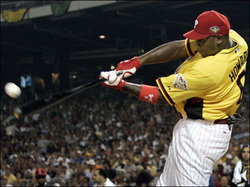 I have played Fantasy Baseball for years and it still remains my favorite fantasy sport, even more-so than football. Baseball is so much more consistent then football and I appreciate that. However, baseball can be complicated and someone who is clueless come draft day may end up destroying their entire season before it begins, I know this because it happened to me more than once. Here are 5 simple strategies to draft a winning team. 1. Leave your bias at the door I am a Red Sox fan which means that I hate the Yankees, that bias can do two things to me. I can overvalue the Red Sox or undervalue a Yankee because I hate them. People are the same everywhere you go and they often want to own their favorite player, which means they will draft guys way too early. They also have no clue who some of the best players are in the smaller markets. I took place in many drafts where players like Holliday, Atkins, Harang and Han-Ram dropped way too low. So leave your bias at the door or else you will be making a quick exit from the league contenders. 2. Know the Scoring Settings This seems obvious, but many people forget to do this and it is one of the most important aspects of any draft. A players value may increase or decrease depending on what stats are used. 3. Positional Values Some positions are deep and some positions are shallow with talent. Usually if you miss out on a top tier first basemen you can find one in the later rounds that are just as good, however if you miss out on a top tier 2B then you will quickly find out that there is not much there. Why pick Ortiz in the second round when you can get equal power and average in the 6th round? 4. Don't over think This is a major fault for most people in the fantasy sports world. We become scouts while we thumb through magazines or click through player rankings. We try to find the diamond in the rough and instead we find nothing but rough. 5. Don't focus on one stat You don't want to focus too much on one stat, unless that stat contributes to other stats, such as batting average or homeruns. If you focus on stolen Bases you will end up with a team that scores a lot of runs and steals bases, but usually has poor homerun numbers and RBI numbers. If you focus too much on saves then you will have insufficient starting pitching, which then leads to weird problems with your ERA. Just be careful because owners can have a tendency to zone in on one stat for a few rounds in a draft and end up hurting their team in the process. It is fine to be great in one stat, just make sure you are competitive in other states as well.
This is your new blog post. Click here and start typing, or drag in elements from the top bar.
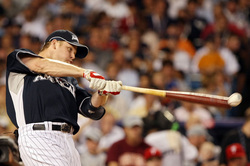 The time has come to figure out what players have found a new home, what teams are shaping up to be quality contenders and who the hotshot rookies are. Just recently, I learned from my brother that the Mets are on the verge of signing Tim Redding. As he said when he broke the news to me, "Start printing the playoff tickets." We had a good laugh, but then again, even a bad pitcher on a good team... To keep from embarrassing yourself on draft day, now would be a good time to find out who retired in the off-season and who is already ruled out for the year. Don't get caught calling Greg Maddux, Salomon Torres, Todd Jones or Chad Cordero or your gaff will be remembered and brought up by your unsympathetic league mates for years and years to come. If you are a complete fantasy baseball lunatic (or nerd) like I am and you belong to several leagues, it is also time to ponder basic league specific strategy ideas. Between straight drafts, auctions, 4x4 scoring systems, 5x5 scoring systems, points leagues, leagues with daily transactions vs. leagues with weekly transactions, AL or NL only vs. both AL and NL player pools, keeper leagues, leagues with salary caps, etc., you really need to get mentally square way before the season starts. With a basic understanding of the architecture of the leagues you are competing in, the real pre-season fun can begin! Keeper leagues should be dealt with first. You need to know who will be on those teams to begin with so you know what your strengths and weaknesses are. A good keeper league team builder should also target a fantasy stud to fill the most glaring weakness of the team. For instance, if you need home runs desperately, target Ryan Howard. If you need steals, look at Jacoby Ellsbury. If you are pretty balanced and need to bolster all categories, Grady Sizemore should be in the center of your bulls-eye. The same principles apply to pitching stats, but keep in mind that pitchers are harder to predict. Saves is perhaps the most predictable pitching category but even bad closers can post inflated saves numbers so don't overvalue this category. After all of these preliminary issues are dealt with, you can begin in earnest to scout players. The best way to approach it is to read a few fantasy baseball articles on Sportsline.com or any other reliable fantasy sports source. Doing so will get you up to speed on what the experts think and will get you pointed in the direction you need to head. From there, research the players you find interesting to determine their value to their current team and look for year to year trends to determine if they are likely to maintain, grow or slow their pace. You also need to scout all the players, not just the top guys. Oftentimes, leagues are won late in drafts or on the waiver wire! Always remember, fantasy baseball is more of an art than a science. Trust your baseball intuition! If you have taken the right approach to the fantasy baseball season, your preparation will give you confidence and you will draft well. If you scramble through a magazine fifteen minutes before your draft, chances are your results will suffer. One of my favorite clichés certainly applies to fantasy baseball: If you're failing to plan, you're planning to fail!
This is your new blog post. Click here and start typing, or drag in elements from the top bar.
Fantasy hockey is a fun and exciting sport, and it is a great hobby for people who are fans of the National Hockey League (NHL). The National Hockey League (NHL) is an unincorporated, non-profit association. The association controls and operates the major professional ice hockey leagues. This ice hockey league has 30 franchised members which form the club. Six teams come from Canada, while the 24 teams that comprise the NHL are based in the United States. The headquarters of the NHL can found in New York City. The NHL is considered as the biggest professional premier ice hockey league in the world. It is a sport in the same league as basketball in the National Basketball Association (NBA) and American football in the National Football League (NFL). It is also one of the main sports in Canada. The main championship trophy that the various NFL teams have been contending for is called the Stanley Cup. It is said to be the oldest professional sports trophy given in the North American region. Now that you have a bit of background about the NHL, let’s give you a bit of information about fantasy hockey. Fantasy hockey is another variation of fantasy sports. In fantasy hockey, you are a player called the manager or team owner. And just like in real life, you have to build a team that has a fighting chance to win in competition against other fantasy hockey team owners. The very foundation of fantasy hockey is the statistics which comes from the professional hockey teams. Most of the fantasy hockey games are basically based on the statistics generated by the National Hockey League. A particular type of fantasy hockey pool is usually comprised of 8 to 12 teams, though it is not unusual for a fantasy hockey league to have as much as 20 teams (all the more fun it would seem). Pools that have more than 20 teams may sound like a party on the weekend during fantasy gathering, but it actually is detrimental as it begins to dilute the average talent. However, more than 20 teams in a fantasy hockey pool somehow come close to replicating the real NHL which, as you know, has 30 teams. There are other forms of fantasy hockey games and some of these allow an unlimited count of hockey teams. In this variation, the team owners may draft the same player or players. And in this variation, there is a typical restriction in the amount of trades the owner can negotiate. If you are a major fan of NHL and hockey, the best way to elevate your experience is to join a fantasy hockey team.
Here are fantasy tips that we recommend you follow so you not only get to enjoy the fantasy football games, you also might win that trophy. Good luck with your fantasy football games! Tip # 1: Always be active in your league. Participate as much as you can. Do not commit to the league if you will only lose interest in the middle of the season. Nothing is more annoying and inconsiderate than an absent fantasy player ruining the set up and the dynamics of the league by his or her inconsideration. Tip # 2: There is such a phenomenon as contract year, which is known in fantasy circles as the contract year bump. Players who fall under the contract year bump is observed, and in some cases guaranteed to perform better. The motivation for the football player will be the contract dangling at the end of the season. Research on players with a contract year bump then try to get them in your draft. Tip # 3: Take it easy, relax it’s just a game, a hobby. Sometimes, passionate fantasy owners get carried away with the game. This is a good thing because that means the owner is enjoying the game. But for it to be stressful and too emotional is kind of a buzz killer, so just take it easy. Tip # 4: No to fighting. When you find yourself in a heated argument with another player, try to stop yourself from doing this. The animosity that stems from confrontation can really change the dynamics of the league. And in fact, make it a bad situation. Tips # 5: Going with your gut is okay sometimes. In order to be a great fantasy owner, you have to do your homework and do a lot of research about the NFL. After all, the game is about statistics and data, and you should base your decisions on that. However, there will come a time where situations arise and you need to use your gut feeling. Do not be tormented and just go with it. If you have done your research, your gut will be well-informed and it will come up with a more inspired decision. Tip # 6: Always be in the lookout for NFL players with injuries. Injuries are a main factor in the performance of a team. It is especially true if the ailing player is a quarterback. This is the part where you do your homework. Read up on the latest NFL news, including injuries, on a daily basis. Tip # 7: The kickers in the NFL should be the last position that you should fill out in your team. It just works better that way.
Isn’t daily fantasy sports gaming one of the best innovations made for a sports fan? Not only do you enjoy the thrill of the sport, you have the ability to recreate and be involved in it through playing daily fantasy sports. One of the daily fantasy sports that I am part of is fantasy hockey. It may not be the most popular daily fantasy sports out there, but I love watching ice hockey, which makes me enjoy playing fantasy sports even more. Now, when you play fantasy hockey, you want to win games right? You are there and in it to, well, win it. We want to help you out so these are tips that we have researched and have learned through the years of playing daily fantasy sports. We hope that you find it useful and hopefully win money or pride by being the team manager of a winning fantasy hockey team in your daily fantasy sports league. First, we shall give you advice when getting forwards. The number one tip is to always make sure that you have star players in your draft. These star players are also known as power players. Your draft should definitely consist of power players. After all, the NHL has about 30 teams and these teams each have their own power players. Why choose a player with no power when the team you can build should have all star players only? The only exception of you having non-power players is when your hockey fantasy pool has more than 12 teams. The second tip we have for you is always avoid a player with either a very high or an extremely low assist-to¬-goal ratio. The logic behind it is very simple: great passers suffer more compared to goal scorers. The thing is, scoring seems to accumulate points in most leagues’ scoring category. On the other hand, a very high goal-to-assist ratio would result in a player revealing he really is a great offensive weapon, but is simply lucky to score. Moving on to another tip, not everyone will agree to this, but do not draft rookies in your fantasy hockey team. The truth is, in the NFL, prime power roles are not really given to rookies on the onset. So if you want to win, avoid getting rookies and stick with the effective players. Of course, you might be the type of owner who wants to be known as the person who discovered a rookie star. If that is the case, go ahead and knock yourself out. It may be possible that a rookie really might turn out to be the next breakout star, although, they usually do not turn out that way.
|

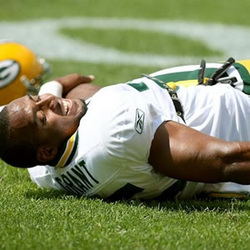





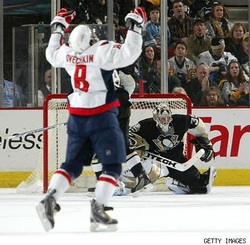
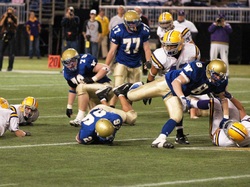
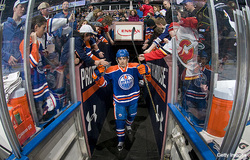
 RSS Feed
RSS Feed